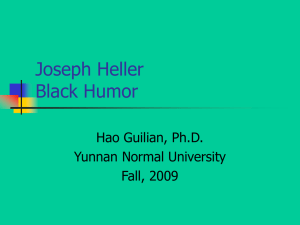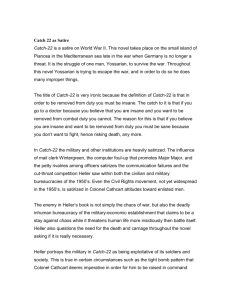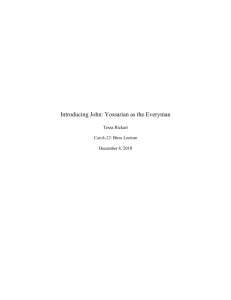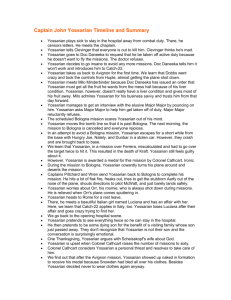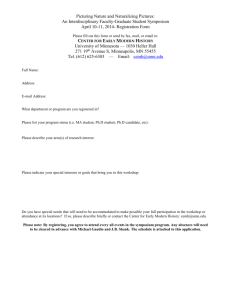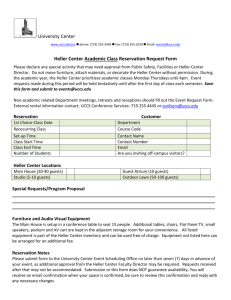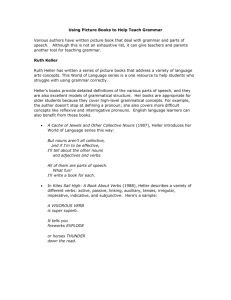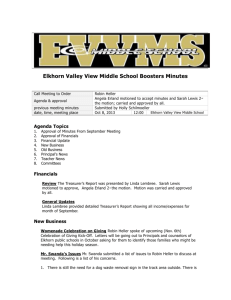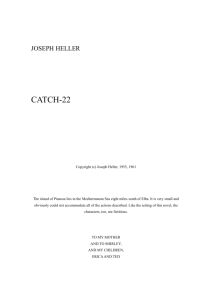chapter qu3stions for catch 22 __2_.doc
advertisement
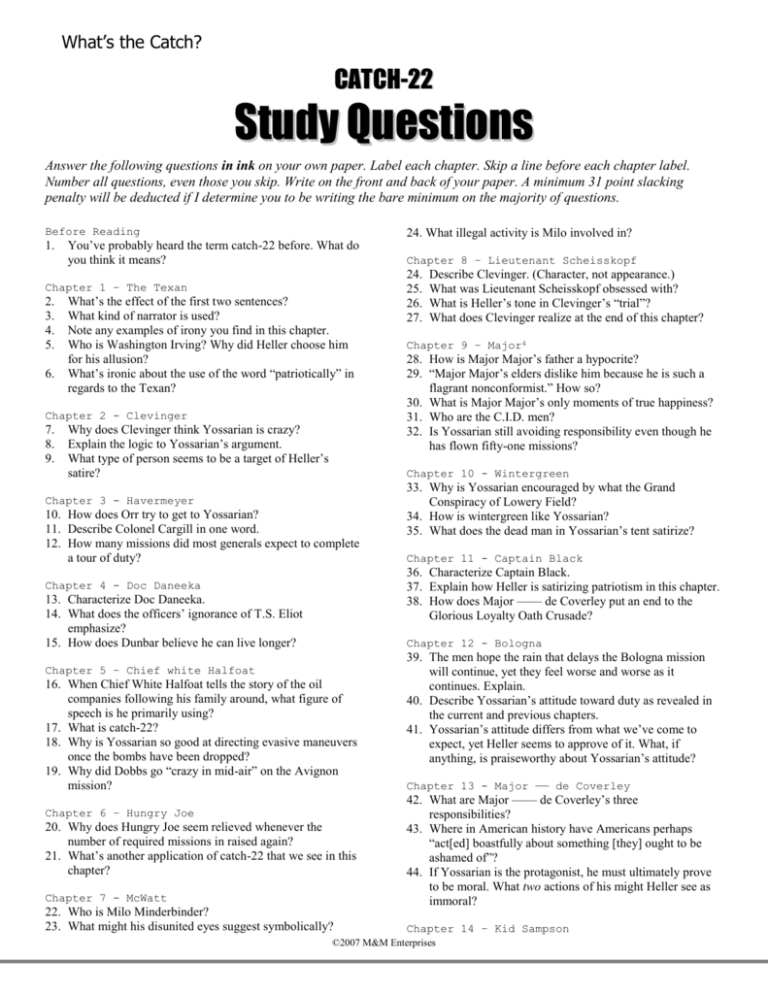
What’s the Catch? CATCH-22 Study Questions Answer the following questions in ink on your own paper. Label each chapter. Skip a line before each chapter label. Number all questions, even those you skip. Write on the front and back of your paper. A minimum 31 point slacking penalty will be deducted if I determine you to be writing the bare minimum on the majority of questions. Before Reading 1. You’ve probably heard the term catch-22 before. What do you think it means? Chapter 1 – The Texan 2. 3. 4. 5. 6. What’s the effect of the first two sentences? What kind of narrator is used? Note any examples of irony you find in this chapter. Who is Washington Irving? Why did Heller choose him for his allusion? What’s ironic about the use of the word “patriotically” in regards to the Texan? Chapter 2 - Clevinger 7. 8. 9. Why does Clevinger think Yossarian is crazy? Explain the logic to Yossarian’s argument. What type of person seems to be a target of Heller’s satire? 24. What illegal activity is Milo involved in? Chapter 8 – Lieutenant Scheisskopf 24. 25. 26. 27. Describe Clevinger. (Character, not appearance.) What was Lieutenant Scheisskopf obsessed with? What is Heller’s tone in Clevinger’s “trial”? What does Clevinger realize at the end of this chapter? Chapter 9 – Major4 28. How is Major Major’s father a hypocrite? 29. “Major Major’s elders dislike him because he is such a flagrant nonconformist.” How so? 30. What is Major Major’s only moments of true happiness? 31. Who are the C.I.D. men? 32. Is Yossarian still avoiding responsibility even though he has flown fifty-one missions? Chapter 10 - Wintergreen Chapter 3 - Havermeyer 10. How does Orr try to get to Yossarian? 11. Describe Colonel Cargill in one word. 12. How many missions did most generals expect to complete a tour of duty? 33. Why is Yossarian encouraged by what the Grand Conspiracy of Lowery Field? 34. How is wintergreen like Yossarian? 35. What does the dead man in Yossarian’s tent satirize? Chapter 11 - Captain Black 36. Characterize Captain Black. 37. Explain how Heller is satirizing patriotism in this chapter. 38. How does Major —— de Coverley put an end to the Glorious Loyalty Oath Crusade? Chapter 4 - Doc Daneeka 13. Characterize Doc Daneeka. 14. What does the officers’ ignorance of T.S. Eliot emphasize? 15. How does Dunbar believe he can live longer? Chapter 12 - Bologna Chapter 5 – Chief white Halfoat 16. When Chief White Halfoat tells the story of the oil companies following his family around, what figure of speech is he primarily using? 17. What is catch-22? 18. Why is Yossarian so good at directing evasive maneuvers once the bombs have been dropped? 19. Why did Dobbs go “crazy in mid-air” on the Avignon mission? Chapter 6 – Hungry Joe 20. Why does Hungry Joe seem relieved whenever the number of required missions in raised again? 21. What’s another application of catch-22 that we see in this chapter? Chapter 7 - McWatt 22. Who is Milo Minderbinder? 23. What might his disunited eyes suggest symbolically? 39. The men hope the rain that delays the Bologna mission will continue, yet they feel worse and worse as it continues. Explain. 40. Describe Yossarian’s attitude toward duty as revealed in the current and previous chapters. 41. Yossarian’s attitude differs from what we’ve come to expect, yet Heller seems to approve of it. What, if anything, is praiseworthy about Yossarian’s attitude? Chapter 13 - Major —— de Coverley 42. What are Major —— de Coverley’s three responsibilities? 43. Where in American history have Americans perhaps “act[ed] boastfully about something [they] ought to be ashamed of”? 44. If Yossarian is the protagonist, he must ultimately prove to be moral. What two actions of his might Heller see as immoral? Chapter 14 – Kid Sampson ©2007 M&M Enterprises 45. How does Yossarian sabotage the intercom system so that his plane has an excuse to turn around? 46. What is a “milk run”? Chapter 15 – Piltchard and Wren 47. What’s Heller’s opinion of Piltchard and Wren? How do we know? 48. What does Orr seem to attract? Chapter 16 - Luciana 49. What example of catch-22 do we see in this chapter? Chapter 17 – The Soldier in White 50. Why might Heller keep hinting about Snowden’s death instead of just revealing what happened? 51. What does the soldier in white symbolize? 52. How is Doc Daneeka a walking contradiction? Chapter 18 – The Soldier Who Saw Everything Twice TWICE 53. Through their conversation, it’s revealed that the two supposed atheists do believe in God but have differing conceptions. Describe their conceptions of God. 54. What do you think Heller’s opinion is of “this business of illusion”? 55. What is Heller satirizing in the scene where Yossarian pretends to be Giuseppe? Chapter 24 - Milo 69. How does Milo justify the bombing of his own base? 70. How are Milo and Yossarian further differentiated in this chapter? Chapter 25 – The Chaplain 71. How does Heller want the reader to feel about the chaplain? How can you tell? 72. What religious allusions are made in this chapter? 73. How does Heller continue to reveal his theme of a breakdown in communication? Chapter 26 - Aarfy 74. How is Aarfy a sadist? 75. Why is aarfy to blame for Yossarian getting wounded? Chapter 27 – Nurse Duckett 76. Major Sanderson’s interest in psychiatry seems to stem from what? 77. How does Heller show that Yossarian is actually much saner than Sanderson and, by extension, most of the other people in the book? Chapter 28 - Dobbs 78. How are Yossarian’s and Dobb’s roles reversed? 79. What is odd about Orr’s last crash landing? Chapter 19 – Colonel Cathcart 56. What is the only reason Cathcart decided to have the chaplain say a prayer before each mission? 57. How does Heller align Catchcart’s feelings of class superiority with racism? 58. Describe Cathcart’s character. Chapter 29 - Peckem Chapter 20 – Corporal Whitcomb Chapter 30 - Dunbar 59. How is Whitcomb like Cathcart? 60. How is paramnesia related to the structure of the novel? 82. In Heller’s point-of-view, Dunbar’s refusal to drop his bomb on the undefended town is seen as what? 83. Clearly, Nurse Duckett has changed her opinion of Yossarian since the beginning of the book. How might that be interpreted? 84. Why doesn’t Yossarian want McWatt, who has just killed Kid Samson, to kill himself? 80. What does the italicized vocabulary on page 329 emphasize about Peckem? 81. What’s ironic about Colonel Cathcart trying to impress General Peckem? Chapter 21 – General Dreedle 61. Cathcart thinks Yossarian’s name is like the words subversive, seditious, insidious, socialist, suspicious, fascist, and Communist. Which of these are accurate descriptions of Yossarian? 62. What’s the effect of Heller having Cathcart write so many exclamation points after “Yossarian,” “Black Eyes,” and “Feather in My Cap”? 63. Why do you suppose Yossarian doesn’t wear his uniform to the military award ceremony and Snowden’s funeral? Chapter 31 – Mrs. Daneeka 85. What is ironic about Doc Daneeka’s “death”? Chapter 32- Yo-Yo’s Roomies 86. Why does Yossarian think that the smart ones are “introverted and repressed”? Chapter 22 - Milo the Mayor 64. How is Yossarian’s morality made clear in the parts of this chapter? 65. How is Milo able to sell eggs for 5 cents each that he bought for seven cents each and make a profit? 66. Explain Milo’s corruption. Chapter 33 – Nately’s Whore Chapter 23 – Nately’s Old Man Chapter 34 - Thanksgiving 67. What do you think Heller thinks of Aarfy’s misogyny? How can you tell? 68. How is Nately’s debate with the old man similar to Yossarian’s debate with Clevinger? 89. Why does Heller unite the character in chapter one in the hospital once again? 87. What does the fact that the high-ranking officers feel they have no power without their uniforms suggest? 88. After Nately’s whore falls in love with him, how does he act? Chapter 35 – Milo the Militant ©2007 M&M Enterprises 90. How and why does Milo manipulate Cathcart into getting the men to fly more missions? 91. How is the reader meant to feel about Milo by the end of this chapter? Chapter 36 – The Cellar 92. Contrast the chaplain’s and Whitcomb’s reaction to news of the twelve men killed in action. 93. How is the chaplain’s interrogation related to events in the 1950s? Chapter 37 – General Scheisskopf 94. What is so ironic about Scheisskopf’s promotion? Chapter 38 – Kid Sister 95. Why does Nately’s whore blame Yossarian for Nately’s death? 96. What was wrong with the deal Piltchard and Wren offered Yossarian and how does that reflect on the military leadership? 97. How does Yossarian start becoming a hero? Chapter 39 – The Eternal City 98. What’s the latest interpretation of catch-22? 99. How is Heller’s humanism fully revealed in this chapter? 100. If you read the last sentence of this chapter and then the title of the next, what might you expect is in store for Yossarian? Chapter 40 – Catch-22 101. Explain the catch to Yossarian being sent home. 102. Why would Cathcart and Korn rather not court marshal Yossarian? 103. For the first time, Yossarian tells someone to call him Yo-Yo. Why is that appropriate at this time? 104. What’s significant about Nately’s whore finally succeeding in harming Yossarian? Chapter 41 - Snowden 105. Just by reading the title of this chapter and recognizing where it comes in the book, what do you expect to be told in this chapter before you read it? 106. Who/What might Yossarian’s “pal” be? 107. What is Snowden’s secret and how does it relate to Yossarian’s situation? Chapter 42 – Yossarian 108. Danby and Yossarian are both inherently moral people. What’s the primary difference between them? 109. Considering the news about Orr, his name suddenly becomes significant. Explain the symbolism in his name. 110. Yossarian says that he and Orr are not the escapists. Who then does he think are the escapists? 111. Do you agree that Yossarian is running to responsibility, not away from it? 112. Does the somewhat happy ending surprise you? Does it feel satisfying or artificial to you? A Brief Introduction to Joseph Heller Joseph Heller himself has recounted the story of his early life in his latest book Now and Then (1998). He was born in Brooklyn in 1923 and grew up on Coney Island. At the outbreak of World War II, he worked first in a navy yard and then enlisted in the U.S. Army Air Forces, training at bases in South Carolina before flying sixty missions as bombardier in B-25s in North Africa and Italy. After the War he went through college and graduate study at the University of Southern California, New York University (B.A. 1948), Columbia (M.A. 1949), and Oxford (Fulbright Scholar, 1949-50). During this time he began to publish short fiction. Two years of teaching composition at Penn State followed, till in 1952 he returned to New York as a writer in advertising and promotions for Time, Look, and McCall's. Hunched at his Time desk one morning in 1953, Heller wrote out longhand the first section of "Catch 18," the start of his war novel Catch-22 (1961). The extraordinary and sustained impact of that novel, both with critics and readers, was only the beginning of a literary career that now encompasses eight major books as well as stage plays, screenplays, short stories, articles, and reviews. Heller's long-mulled second novel, Something Happened (1974), switched attention to the anxieties and competition of civilian management. Good as Gold (1979) has a double target: not only does it follow a hustling English professor into the world of presidential public relations, but it is also searchingly concerned with the ex-professor's identity as a Jewish-American and his relations with his extensive family. God Knows (1984) carries that theme daringly into the Old Testament itself, reimagining the deathbed autobiography of King David in Heller's distinctive mingling of the philosophical, the satiric and the absurd. In the early 1980s, Heller became first paralyzed and then seriously weakened by a deadly nerve disease, GuillainBarre Syndrome; with his friend Speed Vogal, he interpreted this experience and his recovery in the collaborative work No Laughing Matter (1986). Heller's next (anti-)novel, Picture This (1988), juxtaposes great figures from Western culture (Plato, Rembrandt) with twentieth-century America to exploit the recurrent clashes between genius and power. His novel, Closing Times (1994), comes full circle by reuniting the wartime heroes of his first book — Yossarian, Milo Minderbinder, and the others — in New York fifty years later. Closing Times received wide critical acclaim: according to one reviewer, it showed "a national treasure at work," and it brought renewed recognition of Mr. Heller's place as one of the greatest and most distinctive of twentieth-century Anerican novelists. His posthumouslypublished novella Portrait of an Artist, as an Old Man (2000) provided critics with further opportunity for appreciative retrospective comment. Mr. Heller's literary achievement brought numerous awards, including the University of South Carolina's Thomas Cooper Medal in 1996. Mr. Heller died on December 14, 1999. ©2007 M&M Enterprises The Catch by NELSON ALGREN There was only one catch and that was Catch-22, which specified that a concern for one's own safety in the face of dangers that were real and immediate was the process of a rational mind. Orr was crazy and could be grounded. All he had to do was ask; and as soon as he did, he would no longer be crazy and would have to fly more missions. He would be crazy to fly more missions and sane if he didn't, but if he was sane he had to fly them. Yossarian was moved very deeply by the absolute simplicity of this clause and let out a respectful whistle: "That's some catch, that Catch-22," he observed. "It's the best there is," Doc Daneeka agreed. Yossarian was moved deeply day and night and what moved him more deeply than anything else was the fact that they were trying to murder him. "Who's 'they'?" Clevenger wanted to know. "Who, specifically, is trying to murder you?" "Every one of them," Yossarian told him. "Every one of whom?" "Every one of whom do you think?" "I haven't any idea." "Then how do you know they aren't?" Yossarian had proof, because strangers he didn't know shot at him with cannons every time he flew up into the air to drop bombs on them, so it was of no use for Clevenger to say "No one is trying to kill you." "Then why are they shooting at me?" "They're shooting at everyone." "And what difference does that make?" "I'm not going to argue with you," Clevenger decided, "you don't know who you hate." "Whoever is trying to poison me." "Nobody is trying to poison you." "They poisoned my food twice, didn't they? Didn't they put poison in my food at Ferrara and during the Great Big Siege of Bologna?" "They put poison in everybody's food," Clevenger explained. "And what difference does that make?" There was no established procedure for evasive action. All you needed was fear, and Yossarian had plenty of that. He bolted wildly for his life on each mission the instant his bombs were away. When he fufilled the thirty-five missions required of each man of his group, he asked to be sent home. Colonel Cathcart had by then raised the missions required to forty. When Yossarian had flown forty he asked to be sent home. Colonel Cathcart had raised the missions required to forty-five--there did seem to be a catch somewhere. Yossarian went into the hospital with a pain in his liver that fell just short of being jaundice. If it became jaundice the doctors could treat it. If it didn't become jaundice and went away they could discharge him. Yossarian decided to spend the rest of the war in bed by running a daily temperature of 101. He had found a catch of his own. To preserve his sanity against the formalized lunacy of the military mind in action, Yossarian had to turn madman. Yet even Yossarian is more the patriot than Sgt. Minderbinder, the business mind in action. Even Yossarian has to protest when Minderbinder arranges with the Germans to let them knock American planes down at a thousand dollars per plane. Minderbinder is horrified--"Have you no respect for the sanctity of a business contract?" he demands of Yossarian, and Yossarian feels ashamed of himself. Below its hilarity, so wild that it hurts, Catch-22 is the strongest repudiation of our civilization, in fiction, to come out of World War II. The Naked and the Dead and From Here to Eternity are lost within it. That the horror and the hypocrisy, the greed and the complacency, the endless cunning and the endless stupidity which now go to constitute what we term Christianity are dealt with here in absolutes, does not lessen the truth of its repudiation. Those happy few who hit upon Terry Southern's The Magic Christian will find that, what Southern said with some self-doubt, Heller says with no doubt whatsoever. To compare Catch-22 favorably with The Good Soldier Schweik would be an injustice, because this novel is not merely the best American novel to come out of World War II; it is the best American novel that has come out of anywhere in years. Military Rank—U.S. Air Force Commissioned Enlisted General of the Air Force [special] General [O-10] Lieutenant General [O-9] Major General [O-8] Brigadier General [O-7] Colonel [O-6] Lt. Colonel [O-5] Major [O-4] Captain [O-3] First Lieutenant [O-2] Second Lieutenant [O-1] Chief Master Sergeant of the Air Force [E-10] Chief Master Sergeant with 1st Sergeant Status [E-8] Chief Master Sergeant [E-9] Senior Master Sergeant with 1st Sergeant Status [E-8] Senior Master Sergeant [E-8] Master Sergeant with 1st Sergeant Status [E-7] Master Sergeant [E-7] Technical Sergeant [E-6] Staff Sergeant [E-5] Sergeant / Senior Airman [E-4] (note: Sergeant rank phased out in 1992) Airman First Class [E-3] Airman [E-2] Airman Basic [E-1] ©2007 M&M Enterprises
